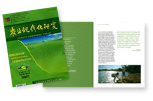- You are here: Home > Research > Research Progress
Asymbiotic N2 Fixation (ANF) may be the primary pathway of external N inputs for those ecosystems lacking (or with a low abundance of) N2-fixing plants, and hence plays a crucial role in predicting the climate-C cycle feedbacks. However, the controls on ANF are poorly understood.
Tree species have great influences on both litter and soil physicochemical properties. Surficial lithology can significantly affect both the chemical and physical properties of soils and have the potential to impact ANF variation.
In recent study, a team of researchers from the Institute of Subtropical Agriculture, Chinese Academy of Sciences (ISA) investigated ANF in litter and soil within the crown radius of the dominant tree species in a karst forest over limestone and a nearby non-karst forest over clasolite, southwest China.
They found that Lithology exerted significant (P < 0.05) influences on ANF in litter but not in soil.
"ANF in litter was 4.9 times higher in the karst forest than in the non-karst forest.” said Prof. Li Dejun, a researcher in ISA. “Tree species had significant effects on litter ANF in the karst and non-karst forests with the rates varying 23-fold and 71-fold, respectively. Significant effect of tree species on soil ANF was only encountered in the non-karst forest.”
The team also found that the strongest explanatory variables were substrate and forest specific, but generally included litter moisture, total nitrogen, total phosphorus, calcium and soil organic carbon.
The results suggest that tree species and lithology may provide new mechanisms explaining the great variation of ANF within and between forests, respectively.
This work was supported by the National Natural Science Foundation of China (41571295), the National Key Research and Development Program of China (2016YFC0502404), the National Key Basic Research Program of China (2015CB452703), the Chinese Academy of Sciences through its Program to Dejun Li.
This study entitled “Tree species effects on asymbiotic N2 fixation in subtropical karst and non-karst forests” has been published in Soil Biology and Biochemistry (Volume 117, February 2018, Pages 185-190) and can be accessed and download online at https://www.sciencedirect.com/science/article/pii/S0038071717306715.
Contact: Li Dejun
E-mail: dejunli@isa.ac.cn
Institute of Subtropical Agriculture, Chinese Academy of Sciences
Address: Mapoling of Changsha City, Hunan province, P.R.China.Tel: +86-731-4615204 Fax: +86-731-4612685

